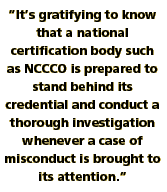NCCCO Polices Its Certifications
September 2014—Unsafe operations, illicit drug use, forgery, and fraud are just four of the ways that CCO-certified crane operators who flout the rules can learn first-hand how the NCCCO disciplinary program works and how, for varying amounts of time—up to and including lifetime bans—they can be deprived of their certification. This can mean, in circumstances where CCO certification is mandated, their ability to work as a crane operator.
 In 2013, NCCCO investigated more than 40 allegations of misconduct by certificants. While this represents less than one twentieth of a percent of CCO-certified individuals, NCCCO treats each complaint seriously in the recognition that any one infraction could have (or have had) tragic consequences. Of the 40 allegations investigated by NCCCO’s Ethics and Discipline Committee, eight were determined to be unfounded, but direct action was taken in six. Others were still under investigation at year-end.
In 2013, NCCCO investigated more than 40 allegations of misconduct by certificants. While this represents less than one twentieth of a percent of CCO-certified individuals, NCCCO treats each complaint seriously in the recognition that any one infraction could have (or have had) tragic consequences. Of the 40 allegations investigated by NCCCO’s Ethics and Discipline Committee, eight were determined to be unfounded, but direct action was taken in six. Others were still under investigation at year-end.
Disciplinary action included suspension and/or revocation of certification, as well as prohibitions on testing for up to one year. Anyone disciplined has the automatic right of appeal to NCCCO’s Board of Directors.
“NCCCO goes to great lengths to protect the integrity of its programs by proactively ensuring compliance with its policies and thoroughly investigating any allegations of misconduct,” said NCCCO’s Manager of Test Integrity, Robert Sampson. As a former police captain, Sampson is well-qualified to conduct investigations and present evidence to the Committee, which is composed of industry veterans with scores of years of crane experience.
“Every candidate signs an agreement to comply both with NCCCO’s Code of Ethics and the Substance Abuse Policy,” says Sampson. “It is part of our job as a nationally accredited and OSHA-recognized certification organization dedicated to quality and integrity to ensure that they do. That’s only fair to their co-workers and to their employer and, frankly, to themselves.”
Cheating, Forgery, and Unsafe Acts
Sampson confirmed that the most common forms of misconduct included cheating during examinations, attempted forgery of certification cards and test results, engaging in unsafe crane operations (whether or not leading to an accident), and failing a drug test.
“No matter what the infraction, no violation of NCCCO policies either by a candidate or a certified individual can, or should be, tolerated,” he said.
NCCCO receives allegations from a variety of sources including co-workers. Employers were, however, most likely to file a complaint, Sampson said.
Mike Trahan, Heavy Rigging & Equipment Construction Manager of Performance Contractors, Baton Rouge, LA, has had to do so on several occasions and has been highly satisfied with the response.
“It’s gratifying to know that a national certification body such as NCCCO is prepared to stand behind its credential and conduct a thorough investigation whenever a case of misconduct is brought to its attention,” he said. “We have been very pleased with NCCCO’s efforts to help root out bad site practices and provide additional protection to those whose daily activity brings them into contact with cranes.”